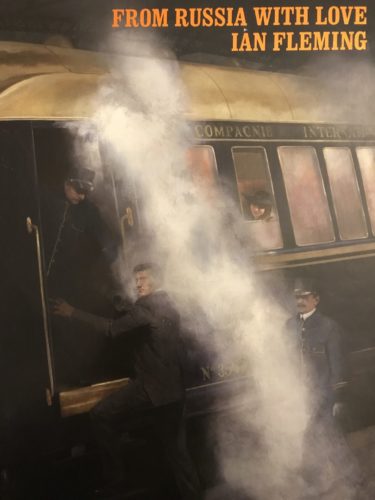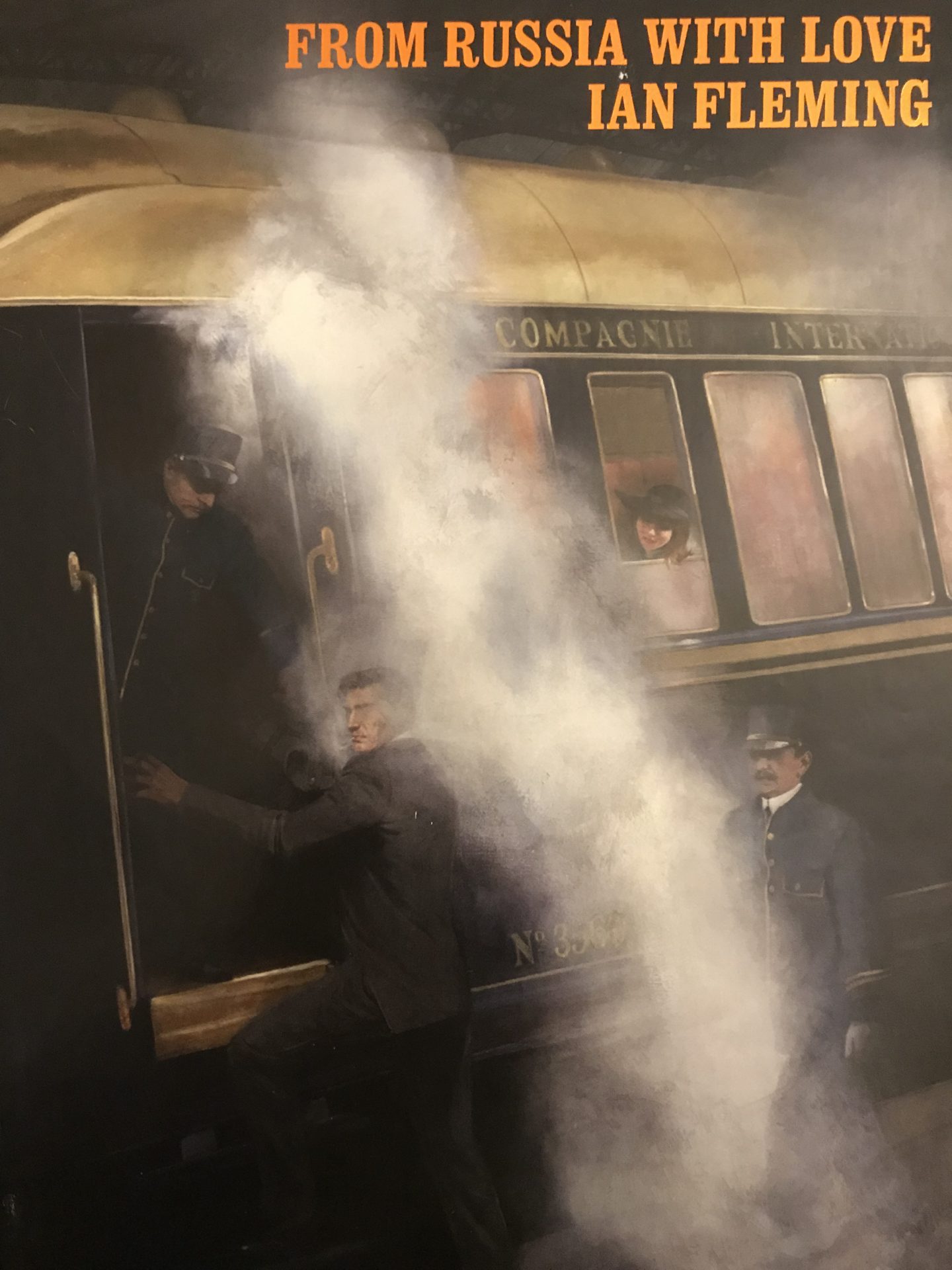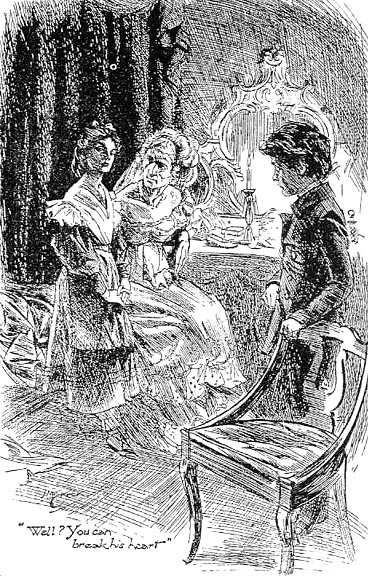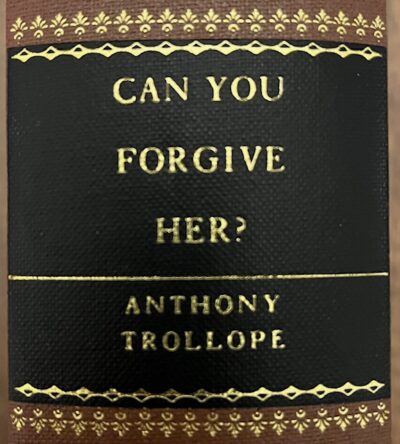“From Russia with Love” review: this was Ian Fleming’s breakthrough. It is a hard-hitting, Soviet-focused romp on the Orient Express. The book delves deep into James Bond’s psychology and habits. It presents top Bond villains Rosa Klebb and Red Grant. This sexist, homophobic cold-war time capsule is nonetheless one of the most gripping of Fleming’s thrillers.
A James Bond novel without James Bond
What if Ian Fleming wrote a James Bond novel in which the hero did not appear until halfway through?
The cover of my Folio Society edition of “From Russia with Love” is by Fay Dalton
Such a book exists. It is the fifth novel in the series, From Russia with Love, which came out in 1957. The first ten chapters of the book outline a dastardly Soviet plot to kill Bond. They take place in Crimea and Moscow within the bureaucracy of SMERSH. This is an actual organisation that Stalin created in 1943. Its name is an acronym for “SMErt SHpionam” or “death to spies”.
These chapters introduce two of Fleming’s most memorable villains. SMERSH Chief Assassin Red Grant is a psychopathic Irishman whose name has been Russified as Krassno Granitski. Comrade Colonel Rosa Klebb is “Head of Otdyel II, the department of SMERSH in charge of Operations and Executions”.
A cold-war time capsule
From Russia with Love works best as a time-capsule of 1950s post-war Britain and its cold war preoccupations. It contains references to Soviet spies Burgess and Maclean, who defected to the USSR in 1951 and resurfaced there in 1956. In the opposite direction it references Nikolai Khoklov, a KGB officer who defected in 1954. Spookily, he received treatment for thallium poisoning in 1957 as the result of a failed assassination attempt. Also in 1956, MI6 diver Lionel “Buster” Crabb disappeared investigating a Soviet warship in Portsmouth Harbour.
Rampant homophobia
In Diamonds are Forever, which I reviewed recently, I noticed outdated attitudes to women and homosexuality. From Russia with Love, too, reflects its era – with knobs on. At one point Bond says: ‘All intellectuals aren’t homosexual. And many of them are bald.’ Many of the most homophobic or sexist comments are made by unsympathetic characters. But some are too offensive to reproduce here even for illustrative purposes.
Check in that baggage, sir!
On a different note, it is striking to see Bond taking on board a plane as cabin baggage, in addition to the Beretta he carries under his jacket, a bag containing ‘fifty rounds of .25 ammunition, in two flat rows, between the leather and the lining of the spine. In each of the innocent sides there was a flat throwing knife, built by Wilkinsons…‘ as well as the silencer for his pistol and fifty golden sovereigns.
But a gripping yarn nonetheless
Despite all this, I enjoyed From Russia with Love. It has taut descriptions and gripping action sequences. It depicts a grubby post-war world where intelligence services are locked in a violent death-spiral of betrayal and assassination. Result: an urgent atmosphere and a driving sense of story. I’d recommend it, if you don’t find the dated attitudes too offensive.
From Russia with Love review – quotes
The book contains curious examples of Bond’s personal habits which make me wonder if I was wrong to dismiss the idea that James Bond might have a salad dressing recipe. Here are a few quotations:
- A great deal of killing has to be done in the USSR, not because the average Russian is a cruel man (sic), although some of their races are amongst the crueller peoples in the world, but as an instrument of policy.
- [A description of James Bond by SMERSH head Colonel General Grubozaboyschikov, “known as ‘G'”] ‘The fact that this spy was decorated with the CMG in 1953, an award usually given only on retirement from the Secret Service, is a measure of his worth.’
- Breakfast was Bond’s favourite meal of the day. When he was stationed in London it was always the same. it consisted of very strong coffee, from De Bay in New Oxford Street, brewed in an American Chemex, of which he drank two large cups, black and without sugar. The single egg… was boiled for three and a third minutes. It was a very fresh, speckled brown egg from French Marans hens… (Bond disliked white eggs and, faddish as he was in many small things, it amused him to maintain that there was such a thing as the perfect boiled egg.) Then there were two thick slices of wholewheat toast, a large pat of deep yellow Jersey butter and three squat glass jars containing Tiptree ‘Little Scarlet’ strawberry jam; Cooper’s Vintage oxford marmalade and Norwegian heather Honey from Fortnum’s. The coffee pot and the silver on the tray were Queen Anne, and the china was Minton, of the same dark blue and gold and white as the egg-cup.
- Bond had got into a hopeless wrangle with Troop over the employment of ‘intellectuals’ in the Secret Service. Perversely, and knowing it would annoy, Bond had put forward the proposition that, if MI5 and the Secret Service were to concern themselves seriously with the atom age ‘intellectual spy’, they must employ a certain number of intellectuals to counter them. ‘Retired officers of the Indian Army,’ Bond had pronounced, ‘can’t possibly understand the thought processes of a Burgess or a Maclean… They certainly wouldn’t take the risk of revealing themselves to some man with a trench-coat and a cavalry moustache and a beta minus mind.’ ‘Oh really,’ Troop had said with icy calm. ‘So you suggest we should staff the organisation with long-haired perverts.’
- ‘Those whom the Gods wish to destroy, they first make bored.’
- [Bond’s aircraft is caught in a storm. Other passengers panic.] In the centre of Bond was a hurricane-room, the kind of citadel found in old-fashioned houses in the tropics. These rooms are small, strongly built cells in the heart of the house, in the middle of the ground floor and sometimes dug down into its foundations. To this cell the owner and his (sic) family retire if the storm threatens to destroy the house, and they stay there until the danger is past. Bond went to his hurricane-room only when the situation was beyond his control and no other possible action could be taken. Now he retired to this citadel, closed his mind to the hell of noise and violent movement, and focused on a single stitch in the back of the seat in front of him, waiting with slackened nerves for whatever fate had decided for BEA Flight No.130.
- Then they were there and the plane’s four propellers wheeled to a stop outside the fine modern airport of Yesilkoy, an hour’s drive from Istanbul.
- It [Istanbul] should have been Arabian Nights, but to Bond, seeing it first above the tops of trams and above the great scars of modern advertising along the river frontage, it seemed a once beautiful theatre-set that modern Turkey had thrown aside in favour of the steel and concrete flat-iron of the Istanbul-Hilton Hotel, blankly glittering behind him on the heights of Pera.
- Bond sat down and took a cigarette and lit it. It was the most wonderful cigarette he had ever tasted – the mildest and sweetest of Turkish tobacco in a slim long oval tube with an elegant gold crescent.
- From the first, Istanbul had given him the impression of a town where, with the night, horror creeps out of the stones. It seemed to him a town the centuries had so drenched in blood and violence that, when daylight went out, the ghosts of the dead were its only population. His instinct told him, as it has told other travellers, that Istanbul was a town he would be glad to get out of alive.
- ‘Mark you,’ said Bond, ‘I quite agree about the Russians. They simply don’t understand the carrot. Only the stick has any effect. Basically, they’re masochists. They love the knout. That’s why they were so happy under Stalin. He gave it to them… as for England, the trouble today is that carrots for all are the fashion. At home and abroad. We don’t show teeth any more – only gums.’
- ‘Hope makes a good breakfast. Eat plenty of it.’
- Bond mistrusted anyone who tied his tie with a Windsor knot. It showed too much vanity. It was often the sign of a cad.
I was struck that while SMERSH assassin Red Grant reads PG Wodehouse (“The Little Nugget”) in his spare time, Bond reads Eric Ambler (“The Mask of Demetrios”).
Istanbul bloopers in “From Russia with Love”
As a long-time resident of Istanbul I enjoyed the sinister depiction of the city in From Russia with Love. Several scenes appear faithfully in the 1963 movie. But some gross inaccuracies leapt out at me. For example, Bond refers to the “river frontage” when he means the Bosphorus (not a river – Ed). Kerim Darko, the head of the British Secret Service’s “Station T” in Istanbul, mentions the “Mosque of Sultan Ahmet. Famous Byzantine Frescoes.” Needless to say, the Sultanahmet Mosque contains no frescoes of any kind, much less Byzantine ones. The Ottomans built it after their conquest of the city in 1453.
Movie vs book
Writing this review of “From Russia with Love”, I noted some intriguing differences between the book of From Russia with Love and the movie. In the latter it is not SMERSH itself, or the USSR, which targets Bond, but international criminal organisation SPECTRE, conveniently staffed by ex Soviet experts. What happens to Bond at the end of the book (no spoilers here) also differs markedly from the film version.
James Bond movies are almost inevitably ghastly. Yet some of us continue to watch them. For why, see my blog Spectre: five reasons to miss it & five reasons you’ll see it. I have also blogged on the Bond movies’ bizarre and dated attitudes to women. I mind this more than the dated homophobia and sexism of the books, which in part show how far we have come since the 1950s. Modern Hollywood should be doing better.
What might a modern James Bond look like?
I hope you have enjoyed this “From Russia with Love” review. If you fancy an updated, modern James Bond, check out Helen Gale, the star of my Berlin thriller Blood Summit.








